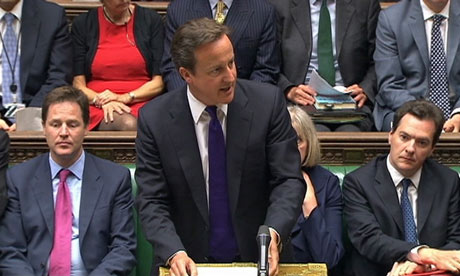The ‘Conservative-led’ Coalition Government, to apply Sir Winston Churchill’s oft-quoted comment on Russia, is nothing short of ‘a riddle wrapped in a mystery inside an enigma’. Nevertheless, we can can try to decode its behaviour in both ideological terms and its necessary translation into action-oriented public policy positions. It shouldn’t be hard. The Economist recently described the Cameron Government as the ‘West’s most radical government’. The formation of the Coalition, to use the jargon of political science, was potentially an ‘inflection point’ in British politics. It has, even with a limited two-year perspective, the potential to be as seismic a political benchmark as the 1945 landslide victory for Clement Attlee’s programme for democratic socialism or Mrs Thatcher’s 1979 election victory for Tory nationalism. The formation of the Coalition created a profound moment of opportunity for the Conservatives under David Cameron. For Andrew Gamble, the Coalition allowed Cameron:
However, the novelty and radicalism of the Coalition’s ideas, policies and general character is in doubt two years after its formation because of a sequence of hesitations, mistakes, ‘u-turns’, vacillations and false starts it has, inadvertent or otherwise, committed. The directionality and coherence of the Coalition’s vision, mission and overall raison d’etre is in question. There are those on the Right who believe the ineptitudes and follies of the Government are attributable to the nature of coalitions per se. As opposed to addressing the concerns of ‘the people’, the Conservative elites’ first priority is propitiating to the Liberal Democrats. For the Left, the Coalition is firstly vicious: this viciousness is played-out through an ideological commitment to a smaller state, an emaciated welfare system and a conceited uninterestedness about inequality. And it is secondly seen as ‘incompetent’ and failing to achieve its own self-described objectives. Even the Cameronite coterie are discontented. The initial radicalism and buccaneering spirit of the first few months in office, they claim, has given way to political timidity, moderation and harmful bargaining. To use George H. W. Bush’s maladroit catchphrase, the Coalition, from multiple perspectives, has lost that ‘vision thing’!
Cameron’s Coalition started off both bold and brazen. Cameron in June 2010 said the reforms and public spending reductions executed by his government would change Britain’s ‘whole way of life’ for a generation and its impact would be felt everywhere. Both Cameron and Nick Clegg in May 2010 declared the Coalition would ‘take Britain in a new historic direction’ and the Coalition, they claimed, ‘has the potential for era-changing, convention-challenging, radical reform’. Another minister in the Coalition said grandiosely that the reforms and cuts proposed presented a ‘unique opportunity to redefine the horizon of expectations’ of the British people. Two years on the prose of policy has substituted the poetry of ideas. How effective has this translation or action-orientation of ideas been? The passage of the Health and Social Care Bill marked the biggest reform of the NHS since its creation in 1947. It has substituted state insurance provision for top-down state delivery. GPs now commission services instead of working in partnerships with Primary Care Trusts, which are being eliminated up and down the country. On education, Michael Gove’s alacrity for supply-side reforms has taken shape in a comprehensive programme of Academisation of secondary schools and some primary schools. The free schools programme, despite suggestions that it would fuel social divisions and undermine local democracy, now has the tacit support of the Labour Party. There are now twenty four, with an additional 79 that will proceed to open in September 2012 for the new academic year. Iain Duncan Smith at the Department of Work and Pensions had introduced radical welfare reform after failed attempts by the Thatcher, Major and Blair governments. The ‘Universal Credit’ is a the new welfare benefit that will replace the miscellany of six of the main means-tested benefits and tax credits between the period 2013 to 2017. It is effectively designed to make the incentives to work ubiquitous regardless of personal circumstances but not too crude as to push individuals and their families into poverty. Reforms to the NHS, education and welfare, even though not without their problems, are areas where the Coalition Government has remained and continues to be bold. Other areas have been less bold and impressive.
Deficit reduction however and the management of the economy remains the stated central priority of the Coalition Government. The accelerated deficit reduction programme, which, if successful, will wipe out the bulk of the structural deficit by 2017. Within this seemingly technocratic, pragmatic and essential policy, there is an ideological commitment to shrinking the size of the state and thus limiting the liabilities of the state. The economic theory on which this plan is based is highly-contentious and given the continuance of the deterioration in the nation’s (and Europe’s) finances, it is being challenged by the alternative strategies like never before. The deeply contentious economic policy of the Osborne Treasury is premised and dependent on the concept of ‘expansionary fiscal contraction’. Otherwise known as ‘expansionary austerity’, EFC predicts that a major reduction in government expenditure will change the future expectations about taxes and government spending and will thus create the space for the expansion of private consumption, which, will in turn, revive the fortunes of the economy. It is the corollary of Ricardian equivalence (i.e. the existence of a deficit deters increases in private consumption because consumers anticipate spending cuts/revenue increases in order to bring down the deficit, thus curtailing their propensity and ability to spend privately). The ‘double-dip’ and return to recession has challenged this strategy. Commentators talk about ‘plan A+’ (i.e. bringing forward infrastructure programmes, deregulating the economy, supply-side measures in employment law, etc) or ‘plan B’ (i.e. Labour’s plans for a temporary reduction in VAT, a N. I. holiday and a deceleration of the public expenditure reductions). Many on the Right of the Party (i.e. David David, John Redwood, Christopher Chope, etc) are convinced Osborne needs to go further (the Right point correctly to the fact that fewer than 10% of the spending reductions have been made yet with less than three years to go before the next General Election) and they point to the record borrowing figures (estimated at £15.2 billion in net borrowing) and the need to tear down the barriers to faster growth. On the Left, Ed Balls and other neo-Keynesians like David Blanchflower argue that short-term extra borrowing will stimulate growth, which in turn will help bring down the deficit by having more tax receipts due to the consequent drop in unemployment (currently above 2.7 million). The Budget of March 2012, for all its controversies and there were many, sent perhaps one single message: there is no alternative to plan A and there is no change from the broad plan and vision set out in the first Coalition Budget in June 2010. The Budget was ‘fiscally neutral’ insofar as where taxes were cut they were increased elsewhere. Added to this was the perennial non-stories of a ‘granny tax’, a ‘pasty tax’ and a ‘caravan tax’. What was symbolic and presentationally problematic was the cut in the top rate of tax for those earning over and above £150,000 from 50% to 45%. It was seen by many, especially the social democratic centres of British politics, as a ‘Millionaire’s Budget’. For the Coalition, it was an embodiment of their belief in aspiration and shrinking the state’s reach in the pockets of individuals and their families.
Otherwise known as ‘expansionary austerity’, EFC predicts that a major reduction in government expenditure will change the future expectations about taxes and government spending and will thus create the space for the expansion of private consumption, which, will in turn, revive the fortunes of the economy. It is the corollary of Ricardian equivalence (i.e. the existence of a deficit deters increases in private consumption because consumers anticipate spending cuts/revenue increases in order to bring down the deficit, thus curtailing their propensity and ability to spend privately). The ‘double-dip’ and return to recession has challenged this strategy. Commentators talk about ‘plan A+’ (i.e. bringing forward infrastructure programmes, deregulating the economy, supply-side measures in employment law, etc) or ‘plan B’ (i.e. Labour’s plans for a temporary reduction in VAT, a N. I. holiday and a deceleration of the public expenditure reductions). Many on the Right of the Party (i.e. David David, John Redwood, Christopher Chope, etc) are convinced Osborne needs to go further (the Right point correctly to the fact that fewer than 10% of the spending reductions have been made yet with less than three years to go before the next General Election) and they point to the record borrowing figures (estimated at £15.2 billion in net borrowing) and the need to tear down the barriers to faster growth. On the Left, Ed Balls and other neo-Keynesians like David Blanchflower argue that short-term extra borrowing will stimulate growth, which in turn will help bring down the deficit by having more tax receipts due to the consequent drop in unemployment (currently above 2.7 million). The Budget of March 2012, for all its controversies and there were many, sent perhaps one single message: there is no alternative to plan A and there is no change from the broad plan and vision set out in the first Coalition Budget in June 2010. The Budget was ‘fiscally neutral’ insofar as where taxes were cut they were increased elsewhere. Added to this was the perennial non-stories of a ‘granny tax’, a ‘pasty tax’ and a ‘caravan tax’. What was symbolic and presentationally problematic was the cut in the top rate of tax for those earning over and above £150,000 from 50% to 45%. It was seen by many, especially the social democratic centres of British politics, as a ‘Millionaire’s Budget’. For the Coalition, it was an embodiment of their belief in aspiration and shrinking the state’s reach in the pockets of individuals and their families.
There is no question that ‘Osbornomics’, as we stand, is in trouble and unpopular. Nevertheless, there are positive precedents for sticking to the original plan however. Geoffrey Howe’s 1981 Budget is oft-sighted as the acme of fiscal prudence and austerity, which was punitive and unpopular in 1981, but for Thatcherites it ensconced a taxation system and a restraint on public spending that ushered in the ‘age of prosperity’ in the mid-to-late 1980s. There is also a precedent of where u-turns in economic policy have not only vitiated the economy but toppled the government and that is the ‘u-turn’ of the Anthony Barber Treasury under the Heath Government in 1972. Barber’s deregulatory and proto-Lawsonian economics by 1972-73, due to international pressures such as the breakdown of the Bretton Woods system, had broken down and interventionist policies were followed in its place. Nevertheless, a u-turn may not be a complete disaster. The Lawson Treasury under Mrs Thatcher abandoned monetarism for a more traditional and less esoteric concern for sound money policies. Nevertheless, no u-turn is contemplated as things stand. Cameron and Osborne look back to the past to find that austerity has delivered Conservative governments re-election. Their raison d’etre has become deficit reduction and they will largely stick to that regardless of the outcome. Who said ideology was dead?
The Lawson Treasury under Mrs Thatcher abandoned monetarism for a more traditional and less esoteric concern for sound money policies. Nevertheless, no u-turn is contemplated as things stand. Cameron and Osborne look back to the past to find that austerity has delivered Conservative governments re-election. Their raison d’etre has become deficit reduction and they will largely stick to that regardless of the outcome. Who said ideology was dead?
Given this bleak backdrop for the government, what should we make of the Queen’s Speech delivered in May 2012? A Queen’s Speech is the apposite opportunity for government to renew itself, to reassert old commitments and introduce new ones. The programme for Coalition 2.0 is problematic for two reasons. Firstly, the Coalition programme for government, published in 2010, has almost been completed and fully implemented. Even as early as May 2011, ministers announced that two-thirds of the 1,276 actions had been completed and 31% were in progress. Given this, the Queen’s Speech needed to be replete with bills to fill the time of the next parliament and reinvigorate the purpose of the Coalition. The fact that there was only nineteen bills (15 bills and 4 draft bills) does not bode well. Secondly, the bills that are in the Queen’s Speech are highly contentious. The Coalition Government let it be known that it intends to plough ahead with reforming the House of Lords as part of a legislative programme for the years ahead that places ‘economic growth, justice and constitutional reform’ at the heart of its agenda. Other proposals include: measures to support families; a change in employment law; reform to public pensions; break-up of the banks; and a proposal to remove the UK from any liability for future EU bailouts. The Tory side of the Coalition will almost unanimously, apart from the uber-modernisers, oppose Lords’ reform and the Liberal Democrats will oppose changes to employment law. Again, the legislative programme here does not bode well for the Coalition Government and its dearth of policies on growth is alarmingly complacent.
Given these problems, it might be interesting and perhaps important to evaluate, from this short-term perspective, how the Cameron Government compares to previous Tory administrations. It may help us ascertain what kind of Conservative Cameron and his coterie of ministers are. In the run-up the General Election of 2010, The Spectator editor, Fraser Nelson, asked, ‘Is Cameron a Heath or a Thatcher?’ Of course, Cameron might not be like either of these two former Tory prime ministers. Nicholas Watt, of The Guardian, suggested Cameron’s political hero is Harold Macmillan, and Ben Jackson and Gregg McClymont suggested Stanley Baldwin was the influence. David Marquand’s innovative ideological map of contemporary British politics provides a solution to the Cameron puzzle. In his majestic book, Britain since 1918: The Strange Career of British Democracy, he divides the events, ideas and individuals of British politics into four ideological types: Democratic Collectivism (i.e. Aneurin Bevan); Democratic Republicanism (i.e. Roy Jenkins); Whig Imperialism (i.e. Edward Heath), and Tory Nationalism (i.e. Marquess of Salisbury). It is the latter two typologies in which (most) Conservative politicians bifurcate into. For Marquand, the Conservative Party under Mrs Thatcher represented a revival of the Tory national tradition, which stresses authority in society and the state. ‘In calm periods’, Marquand writes, ‘when authority seemed secure, tory nationalist voices were rarely heard. In times of trouble, when it was under threat, they were clamant and even raucous.’ For Marquand (and Danny Kruger, a former speechwriter to Cameron), Cameron is best understood as a ‘whig imperialist’. Like other notable Whig imperialists such as Stanley Baldwin and Edward Heath, Cameron sees himself as one of the ‘practical men of the world, genially tolerant rather than self-righteously shrill. They were repelled by dogmatic absolutes and believed that the subtleties of practice would not be captured in any theoretical formula of a neatly packaged creed.’ Therefore, the Whig imperialist tradition, which is Cameron is said to emanate from, is adaptive and self-consciously appealing to ‘practice’. In this respect Cameron can be seen as the ‘heir to Heath’. Heath, for Marquand, ‘was a whig imperialist of sorts’; he did his awkward best to practice the politics of inclusion, power-sharing was one the central themes of his statecraft and he sought to run the economy on a more explicit form of social partnership, embracing the state, organised labour and business. But beneath Heath’s whig imperialism lay a streak of democratic collectivism. Heath was not necessarily dirigiste but he adored the idea of a professionally-run state. This is self-evidently not Cameron and yet they share the whig imperialist tradition, which is distinct from the ideological crusading Conservatism of the Thatcherian 1980s. Stuart White, a Fellow of Jesus College, Oxford, explained this peculiar paradox of Cameronism: his personal approach and style of politics is whig imperialist and yet he’s ostensibly pursuing a Thatcherite agenda. For White, the adaptability of Cameronite Conservatism, as expressed in whig imperialism, explains the ease of his adoption to Thatcherism as Thatcherism represents the prevailing ‘common sense’ in early twenty-first century British politics. The ‘common sense’ of the ‘climate of opinion’ of the Coalition Government is in essence Thatcherite: ‘the state is the problem, markets work, taxes should be lowered, unions should be weak’. The doctrinaire and exasperating nature of Thatcherism was its insurgency disposition on the politics of the 1970s; Cameronism is making adjustments and acculturating the British to that ‘common sense’. For Marquand, both traditions, Thatcherite Tory nationalism and Cameronite Whig imperialism, seek ‘to defend and sustain authority, social and political, but they saw that task in profoundly different ways’. In short, the Coalition Government pursues different means to the same end it has always sought to achieve.
Many on the Right of the Party disagree however. They see Cameron’s style and substance of politics to be alien and extrinsic to the Tory tradition. They believe, to quote Tim Montgomerie, that instead of creating a ‘blue collar conservative’ Party, Cameron and his ‘metropolitan clique’ have created a ‘white collar liberal’ Party. This may be true to an extent, but it is doubtful whether the Right’s prescription for Conservatism and electoral success in 2015 would achieve better results. Cameronism, as it were, is the only game in town. The marrying of social liberalism to Tory dryness on economics is the Conservatism espoused by Boris Johnson in London and the Coalition Government in the country. If the Right of the Tory Party think that the Party is losing the battle of ideas because it is insufficiently Right-wing, the the eight years of modernisation under Cameron and the three election defeats between 1997 and 2005 has been lost on them. The Britain of the 2010s is a much more socially liberal and tolerant country to the one that the Tories governed in the 1980s. Attitudes towards sex, gender, homosexuality, race, abortion and drugs have moved towards a more liberal, social democratic position. Furthermore, there are two problems the Conservative Party faces in the next few years, possibly even beyond that, which will confront them regardless of the creed or type of Conservatism espoused.
The first is the nature of the period of politics between 2010 and 2015. The Governor of the Bank of England, Mervyn King, in April 2010, perhaps Delphically, suggested that whoever were the victors of the election in May 2010, given the austerity they’d have to inflict upon the nation, would be ‘out of power for a generation’. So, will the austerity programme of the Cameron Government make the Tories unelectable for a generation? I think this is quite possible. There are many indicators to suggest this. One of the most forceful indicators of this is that the period of austerity being administered, seven years, is simply unprecedented in its length and severity. At the time of the General Election of 2015, the Tories, along with the other parties, are going to have to promise the nation another round of killer cure austerity!
The second problem is much more fundamental and testing for the Conservative Party and Conservatism more largely. In the US, political commentators have designated their two dominant parties, Republican and Democrat, either ‘minority’ or ‘majority’ party status at different points in time. For example, the Republicans were the majority party from 1868 to 1933 and the Democrats the majority party from 1933 to 1980. In Britain, given the that we change our governments more frequently and do not have a separation of powers, these designations are not easily translatable. Nevertheless, the Conservatives, especially under Mrs Thatcher, often referred to themselves as the ‘natural party of government’. Right-wing think-tanks in the 1980s circulated slogans such as ‘Labour will never rule again’. Harold Wilson in the mid-1970s referred to Labour as the ‘natural party of government’ too. Is anybody the ‘natural party of government’ today? I believe that to be Labour. Over the last twenty years, Labour has won three elections and the Conservatives just one. The Conservatives have not won an outright majority since April 1992. Over this time, Labour have become a more ‘one nation’ Party and the Tories are more a regional, rural, Southern-based Party. Labour have only been out of power for two years, having left Britain with the biggest deficit in the OECD, and yet YouGov polling throughout the early half of May 2012 have put Labour between nine and thirteen points ahead of the Conservatives, giving Labour a more than comfortable majority at the next General Election. This polling data evinces the changed political climate and concomitant change in language and values since the announcement of the Budget in 2012. The 2012 Budget not only damaged the Coalition but simultaneously benefited and advantaged Labour’s standing. Prior to this, the deteriorating economy had done very little to improve Labour’s economic competence ratings. Ben Jackson, Fellow of University College, Oxford, and Gregg McClymont MP , UK shadow minister for pensions, published a stunningly percipient paper, Cameron’s Trap, at the end of 2011 on how Labour need to change the politico-economic narrative in order to achieve a majority at the next General Election. Their central argument is that when austerity and Conservative governance have been intertwined, namely in the 1930s and 1980s, both Baldwin and Mrs Thatcher respectively presented their Tory prescriptions for recovery as ‘common sense’. So, despite persistently high employment in these periods (seen as a ‘price worth paying’ for low inflation), living standards rose for the majority of the populations in the 1930s and 1980s. Furthermore, both Baldwin and Mrs Thatcher effectively demonised the Labour Opposition as ‘profligate’ and ‘incompetent’. Miliband must try and avoid these two narratives from embedding themselves in the collective consciousness of the British people. For Jackson and McClymont, shifting the discourse away from ‘austerity’ and public spending reductions will mean Labour can fight the election on their terms. Arguably, the happenstance of dreadful local elections results for both Coalition parties and the presidential election victory of Parti Socialiste candidate Francois Hollande shifts both British and European politics respectively to the Left. The Tory ‘common sense’ of austerity, efficiency and responsibility, which has prevailed as the dominant discourse of the prognosis of economic recovery since 2010, has given way to the social-democratic tropes of ‘growth’, ‘investment’ and ‘demand’. It is my contention here that the Tory prescription for the future is now designated and consigned ideological minority status. At the height of the Tory Party’s ‘majority status’ position under Mrs Thatcher, it was said that ‘Conservatism swims like a fish in the sea’ and any Labour vote is therefore a ‘deviant one’. The national culture was Tory. This is much changed. Max Hastings, in an article in The Guardian in 2006, aptly summarised the dilemma for Cameron and the Conservatives in post-Thatcher Britain: ‘Britain is now a social democratic country’. It is the Conservatives who are the radical outsiders. Miliband, from the standpoint of mid-2012, can focus on the underperformance of the economy and decline of living standards, all presided over by an aloof Tory elite. So, the Tories have not only, temporarily, lost the future but also the past. The dangers of this don’t need pressing. For George Orwell, ‘who controls the past controls the future’.
For Jackson and McClymont, shifting the discourse away from ‘austerity’ and public spending reductions will mean Labour can fight the election on their terms. Arguably, the happenstance of dreadful local elections results for both Coalition parties and the presidential election victory of Parti Socialiste candidate Francois Hollande shifts both British and European politics respectively to the Left. The Tory ‘common sense’ of austerity, efficiency and responsibility, which has prevailed as the dominant discourse of the prognosis of economic recovery since 2010, has given way to the social-democratic tropes of ‘growth’, ‘investment’ and ‘demand’. It is my contention here that the Tory prescription for the future is now designated and consigned ideological minority status. At the height of the Tory Party’s ‘majority status’ position under Mrs Thatcher, it was said that ‘Conservatism swims like a fish in the sea’ and any Labour vote is therefore a ‘deviant one’. The national culture was Tory. This is much changed. Max Hastings, in an article in The Guardian in 2006, aptly summarised the dilemma for Cameron and the Conservatives in post-Thatcher Britain: ‘Britain is now a social democratic country’. It is the Conservatives who are the radical outsiders. Miliband, from the standpoint of mid-2012, can focus on the underperformance of the economy and decline of living standards, all presided over by an aloof Tory elite. So, the Tories have not only, temporarily, lost the future but also the past. The dangers of this don’t need pressing. For George Orwell, ‘who controls the past controls the future’.
Cameron, like Mrs Thatcher before him, will continue the demonisation of the Labour Party as the Party of the ‘profligate’ and ‘incompetent’, but he must present, if he has any real expectation of reelection, a positive Tory vision of the future, which is flagrantly missing in the emphasis on austerity. Mrs Thatcher communicated the ‘vision-thing’ aspects of Thatcherism by celebrating Britain’s imperial past; a return to ‘pre-progressive’ morality, and the blossoming of ‘popular capitalism’. In Cameron’s case, the Big Society provides this. One might sensibly ask, ‘what happened to the Big Society?’ It has barely been mooted in 2012, despite it being the only positive dimension of contemporary Conservative thinking offered by this generation of Conservatives. Maybe Cameron and his acolytes suffer from temporary amnesia, but as far as I can tell, the once lauded ‘big idea’ has died a quiet but quick death. This is illustrated by Steve Hilton’s unaccounted for departure from Cameron’s team. The Public Administration Select Committee found that many were still confused over the Big Society’s message, and warned that two years into the government there was still no clear implementation plan for the policy. Nevertheless, the abandonment of the Big Society has big risks. The Big Society for the Coalition is for the Conservatives what Michel Foucault called the ‘regime of truth’ – it provides coherence to what looks like dissonant and fragmented ideas and policies. Alas, the abandonment of the idea is what looks like is taking place. Cameron has riskily and wrongly placed all of his political chips on the desire to ‘rebalance’ the economy in a desire to abandon the growth model of the ‘New’ Labour years and promote manufacturing and export-led recovery in the regions. Cameron is aware of the outside dangers to his leadership of the Party and the country. P. B. Shelley reminded us in his sonnet, Ozymandias, of the perishability and inevitability of decline for both leaders and the states they govern. The same fate applies to all leaders, however great, strong, virtuous or cunning. What should give Cameron and Conservative Party some comfort is that most governments face tough times in their second year over tax and spending issues (Attlee in 1947; Wilson in 1966; Heath in 1972; Thatcher in 1981, and Blair in 1999). Nevertheless, the problems the Conservative Party faces today are simply unprecedented. This may be the last Tory-dominated government for a generation given the reasons adumbrated in this article.









1 Comment
You say that Keynesians argue that loose fiscal policy will “bring down the deficit by having more tax receipts due to the consequent drop in unemployment,” but this isn’t the only mechanism. Lower unemployment will also reduce the ‘automatic stabilisers’ of welfare spending, and the boost in aggregate demand will stimulate growth, which will directly reduce the debt to GDP ratio.
If you look back at the wartime debt, the principal mechanism for its reduction was GDP growth, rather than balanced budgets or surpluses. Indeed, after 1945, there were only ever four brief periods of surplus, and yet the debt to GDP ratio came down from 238% (in 1947) to 25% (in 1991), because GDP growth outpaced the increase in the debt.
If you want to go back further than this, you can look to the napoleonic war debt, which was an eye-watering 260% of GDP (in 1821).
In short: The situation we find ourselves in is far from unprecedented!